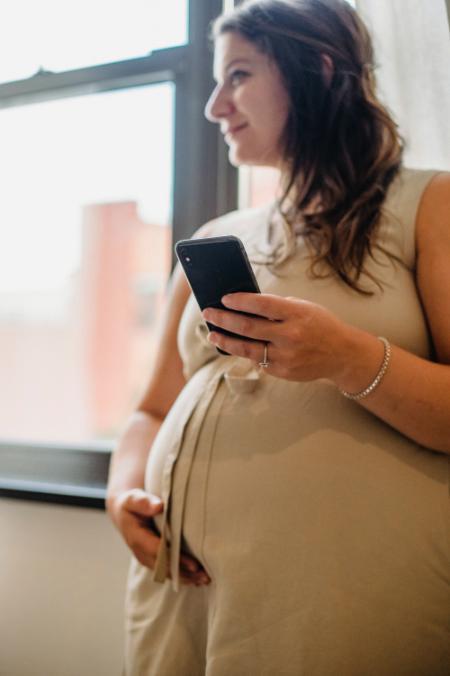Research impact
Health and social impact
 The global burden of disease is increasing worldwide, characterised by rising obesity rates. In Ireland, two thirds of people have overweight or obesity, with an estimated one third of women having obesity. Obesity is a risk factor for negative health outcomes during pregnancy, and improving health behaviours (around diet and lifestyle) can benefit mother and child.
The global burden of disease is increasing worldwide, characterised by rising obesity rates. In Ireland, two thirds of people have overweight or obesity, with an estimated one third of women having obesity. Obesity is a risk factor for negative health outcomes during pregnancy, and improving health behaviours (around diet and lifestyle) can benefit mother and child.
In the PEARS study, women who used the smartphone app had clinically relevant reduced weight gain and improved diet. These benefits hold potential to improve health for both mother and baby in the longer term. By making this smartphone app available to all pregnant women at National Maternity Hospital and potentially to family practice centres in Dublin, Professor McAuliffe and her collaborators are directly translating their research findings into clinical practice.
The app is expected to reach all those attending National Maternity Hospital (8000 mothers annually). When rolled out more widely, the app could improve the health of tens of thousands of mothers and their children across Ireland and beyond.
Health and economic impact
Cost is an essential consideration when translating research into clinical practice, and so a cost-effectiveness evaluation of PEARS was published in 2019. This evaluation looked at a measure of disease burden known as the “quality-adjusted life year” (QALY), which assesses the quality and quantity of life lived after an intervention.
It found that mothers and babies who used the app gained more QALYs than those who received routine care. What’s more, the cost of maternal care and delivery did not significantly differ between the two groups. The app will therefore reduce the burden on the health system and save resources.
Technological impact
A freely available smartphone app (Hollestic) has been developed based on robust scientific findings from the PEARS study. This app was designed by a multidisciplinary team including dietitians, nutrition scientists and medical professionals. It provides recipes for healthy meals to pregnant women, along with exercise advice and a pregnancy tracker. Considering more than 90% of women of reproductive age use smartphones, this presents a fair and wide-reaching route through which to deliver healthy lifestyle advice.
Academic impact
PEARS research outputs have directly shaped the research agenda within the UCD Perinatal Research Centre, and have contributed to the design of current studies including the “LatchOn Study” and “Bump2Baby and Me”.
The “Latch On Study” is a randomised controlled trial of breastfeeding support among women with a BMI > 25, with the primary aim of increasing breastfeeding rates at 3 months. The “Bump2Baby and Me” study is an EU-funded international randomised controlled trial aiming to contribute to the early prevention of maternal and child non-communicable diseases, including diabetes and overweight and obesity.
The “Bump2Baby and Me” study will use a smartphone app that has been informed by findings from the PEARS study to support women during pregnancy and in their babies’ early years.